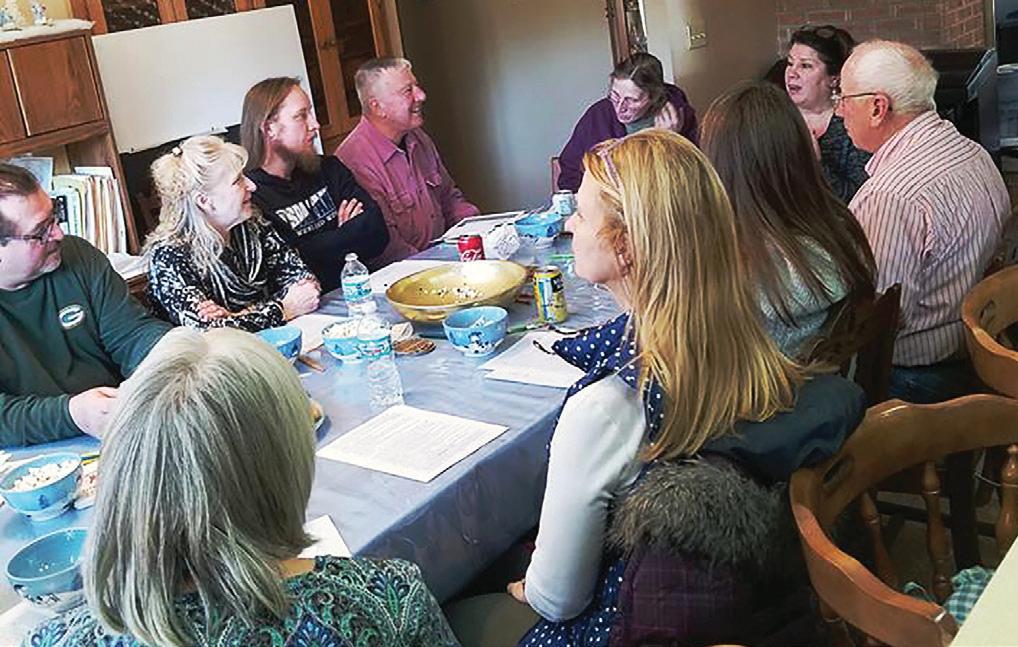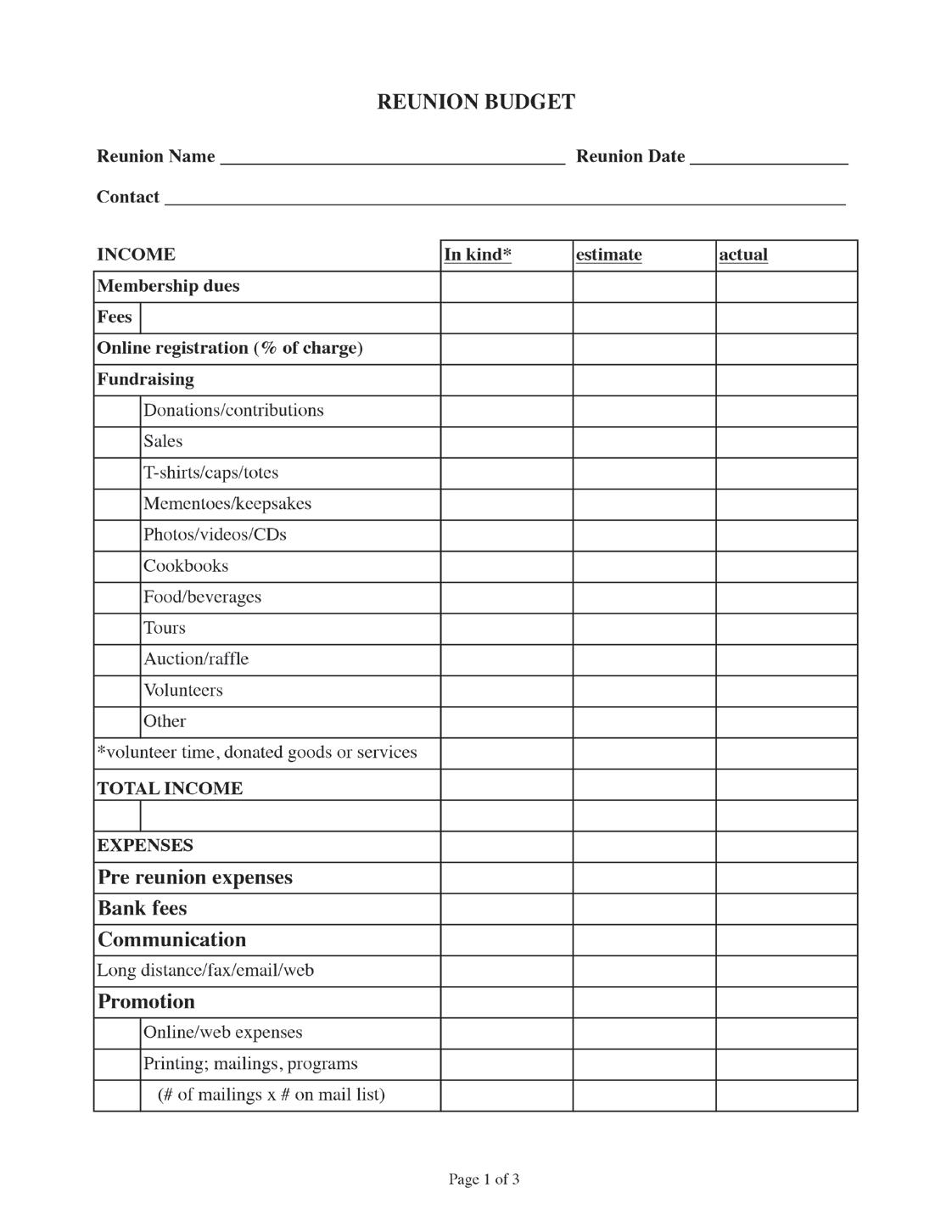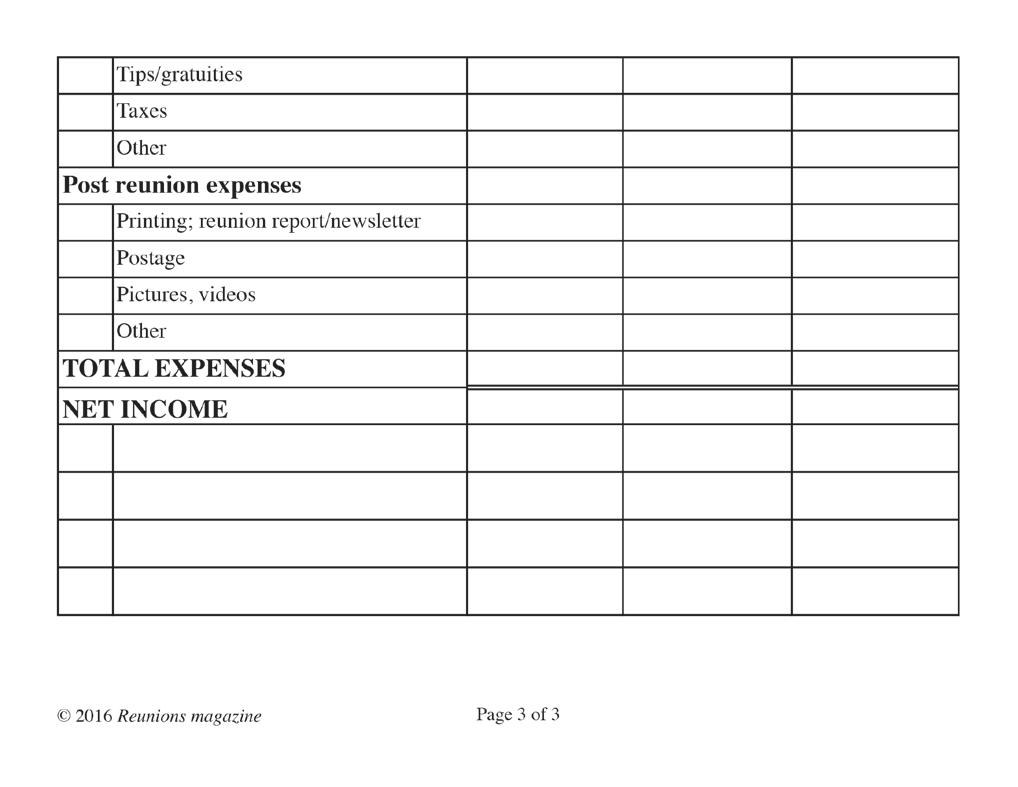
12 minute read
FRONT WORDS
Be in touch!
Planning ahead
Reunions are neither planned overnight nor in a day. If your goal is
Reunions magazine
PO Box 11727 to have the best, most memorable reunion ever, planning is essential. A successful reunion requires good leadership. Careful planning and committed leadership cannot be emphasized enough. No one can tell you that better than someone who did not plan early or take all the details seriously. We learned that from planners who admitted they thought a couple of months was enough to plan all they’d envisioned, only to realize that many details had been overlooked, ignored or simply not realized in time. The first rule of reunion planning, therefore, is to give yourself enough time.
First time reunions may take one to two years before they actually happen. So many details … lots to think about … lots of questions to answer … so many people to contact and hear back from … so many opinions and ideas to take into consideration … so much more planning than you can even imagine! Long standing reunions, of course, have many traditions that are already in place and can happen every year or every few years without a hitch.
Mail to
Milwaukee WI 53211-0727 call 414-263-4567 visit www.reunionsmag.com e-mail editor@reunionsmag.com
Getting started …
If your reunion is a Sunday afternoon potluck picnic in a park, it may take only one or a couple people to plan. But reunions that have evolved over decades are events that even convention and visitors/tourism bureaus (CVB) are interested in investing time and effort in. Contacting the CVB, whether in a distant city or your own home town, is a very wise early step to determine what they are able to help with. Most of their services are free and well worth taking advantage of, no matter what stage of planning you’re at, though the earlier the better.
An essential step in planning any reunion is to not plan alone. Reunion planning should be a team effort. This adds to the enthusiasm and commitment of the reunion. Listen to everyone’s ideas. Many reunions are planned by committees (often more than one) who volunteer to take care of one or more details. That way, no one person is saddled with all the work necessary to stage a successful reunion. There should, however, be one person who oversees all the committees to make sure planning is moving along and on time for a successful reunion.
An important responsibility of the chairperson or leader will be to check with others regularly to make sure everyone is on track. Ask persons in charge of parts of the reunion to report progress regularly.
Delegation is a wise approach to getting details accomplished. When delegating, make sure each volunteer understands the purpose and your expectation of the task. If necessary, write instructions, read them together, then ask questions to make sure the job is understood. Once delegated, it’s important to check back and make sure the persons responsible for various chores/steps/projects/ tasks are doing what they’ve promised. Nothing will be more disheartening than to think someone is getting something done only to discover they’ve not done a thing by the deadline and there’s little you can do about it. A couple years ago, I learned about a reunion where no one checked on the person who was supposed to be making hotel arrangements. He’d not made even one call. End of reunion! It was cancelled because it was too late to get everything they wanted.
Now with the advent of ZOOM meetings, committee members do not all have to be in one place, but can perform their duties from anywhere and report regularly. Though that would not have suited one committee man who reported that he looked forward to committee meetings because “the food was always so good!”
A good place to start is Reunions magazine’s online timetable: www.reunionsmag.com/reunion-timetable/. It starts at the very beginning from when you get the idea to plan a reunion and goes through many steps, some of which may not pertain to what you are planning, but that you might want to consider. The timetable goes all the way to an important final step to evaluate the event and learn what was great and what could be improved. We’ve annotated and linked the timetable online with podcasts and articles to explain the steps and give you ideas about how to do them. While you may not need to do everything, there are many things all reunions have in common. Consider starting with the interest members have in having/coming to a reunion.
The Seidemann Family Reunion is nearing 90 years old, but nonetheless, a large committee meets to review details and progress each year. The annual reunion is on a farm near Newburg, Wisconsin.
continued on page 6
Learn a new way to have a reunion!Learn a new way to have a reunion!Learn a new way to have a reunion!Learn a new way to have a reunion!Learn a new way to have a reunion!Learn a new way to have a reunion! Zoom brings people together. Zoom brings people together. Zoom brings people together. Zoom brings people together. Zoom brings people together. Zoom brings people together.



The more the merrier!The more the merrier!The more the merrier!The more the merrier!The more the merrier!The more the merrier!


Teaches you how to connect, literally and emotionally. Teaches you how to connect, literally and emotionally. Teaches you how to connect, literally and emotionally. Teaches you how to connect, literally and emotionally. Teaches you how to connect, literally and emotionally. Teaches you how to connect, literally and emotionally. Tutorial Videos by: Tutorial Videos by: Tutorial Videos by: Tutorial Videos by: Tutorial Videos by: Tutorial Videos by:

Reunion Timetable
These are suggestions for steps and the time it takes from the time you start your very first reunion. For someone organizing a reunion with a history, this list is also good for checking your progress or as agenda considerations for committee meetings.
If your reunion has a newsletter, include some of these steps from time to time. Your members can better appreciate what their part is, if they know what you need to do when. For example, they might return reservations and t-shirt orders, if they realize your deadline date is not arrived at arbitrarily.
24-18 months before your reunion… [podcast]
• Determine interest [article] [article] • Talk to other reunion organizers • Attend a reunion organizing class, workshop or conference [article] • Start collecting mailing and email list • Form reunion committee(s) and establish responsibilities and schedules [podcast] • Keep records of everything • Develop budget and bookkeeping system • Contact convention and visitors or tourism bureaus [podcast] [article] • Podcast: How to ask for money [podcast] • Search for / visit locations, facilities • Podcast: Hotels are looking for your reunion [podcast] • Set up social media presence! A website, Facebook and
Twitter pages One year before… [podcast]
• Set dates [podcast] • Send Save-the-Date cards [shop] • Choose destination/location/venue • Send first mailer; tentative reunion schedule and plans (tours, souvenirs, memory books), theme, approximate cost, and missing persons list. • Podcast: Art of the loving invitation [podcast] [article] • Begin souvenir directory/list of members, memory book • Arrange or hire entertainment, caterer, photographer, videographer, printer, motorcoach for touring • Podcast: How to hire a motorcoach [podcast] • Reserve picnic area in the park 9-6 months before…
• Visit hotel, meet with staff • Reserve block of rooms • Use website and Facebook pages to send announcements and build excitement • Send second mailer; include registration and souvenir order forms and cost • Send announcement to Reunions magazine; v Include reunion name, date, place and contact info to editor@reunionsmag.com v See examples
• Schedule events and activities — program, speakers, awards ceremony, tours • How to make a fundraising book [podcast] 5 months before…
• Confirm reservations, entertainment (band, DJ, comedian, magician, face painting), photographer, caterer • Choose menu or make cooking/food plans [article] • Announce event to local news media, elected officials • Request proclamations from elected officials • Use social media regularly to update, who’s coming, what’s new and create enthusiasm 4-2 months before…
• Meet with hotel staff, visit facility with reunion committee • Reserve rental equipment; tents, bounce house, tables, chairs, porta-potties • Select decorations, theme, signs and banners • To ensure delivery before your reunion, submit personalized souvenir order (t-shirts, mugs, caps …) and deliver directory/ memory book to the printer 6 weeks before…
• Review committee assignments • Write checklist for reunion tasks • Designate assignments for reunion day volunteers • Podcast: Don’t do it alone: recruit volunteers [podcast] 2 weeks before…
• Purchase last minute decorations and incidental supplies • Reconfirm meeting, sleeping and eating accommodations • Review final checklist The day before…
• Determine location staff contacts assigned to your reunion • Solve last-minute problems • Review final details with reunion committee Reunion day(s)…
• Set up registration tables, rental equipment, displays, decorations • Juggle details; volunteers, food, photographer, games, kids activities, entertainment, tours, ceremonies • Enjoy • Evaluate reunion Afterward …
• Reflect and evaluate — note what worked, what didn’t [article] • Complete bookkeeping; settle accounts • Write thank you notes to volunteers, hotel staff, caterers • Add a reunion summary to your website and Facebook pages • Add lots of pictures and videos • Start planning your next reunion
One person or a small group should start by discussing possible dates. If your reunion is to celebrate your parents’ 50th wedding anniversary or grandma’s 90th birthday, then the date is set but otherwise, you’ll want to consult other members for a good date. Make sure the date will not conflict with special upcoming celebrations that will include large contingents of family members like graduations, weddings, significant birthdays, and retirements. Once you’ve determined positive interest, you must decide when and where the reunion should be. Caution: do not ask everyone when and where because you’ll get as many answers as people you ask. Do some forethought and ask with a couple choices of dates and places and commit to accepting the response. Or you can dictate a date and place and hope everyone agrees. You’ll want to notify everyone as soon as a date is chosen, even before any other details are known. Make the announcement early so members can commit to being there. But here’s one GOLDEN RULE! If you send 50 notices (save the date cards, emails, letters), I guarantee the very first call you’ll receive is from someone who says s/he cannot come. Do not, REPEAT: DO NOT offer to change the date. Say sadly, you’re sorry, but perhaps they’ll be able to attend the next reunion. If you try to change the date at this point after you’ve notified everyone, you’ll always receive that first call over and over again and you’ll never settle on a date. If you’re working far enough in advance, the date is all they really need to know. All the fun details will follow as you plan the event because you’ll want to announce plans as you go along to build interest, excitement and enthusiasm for your reunion. Paying for the reunion is an important consideration in what you plan. An early budget plan will help determine what kind of a reunion you’re going to have. Is a Sunday afternoon potluck picnic what most members can afford? Or can you plan a three-day weekend retreat at a hotel with meetings, tours, entertainment and a banquet? What can your members afford? You must take your planning expenses into account as well as all the plans you have for the actual event. Will everyone pay individually? Or will you charge a

continued on page 8


fee and pay as a group? Will you ask for donations to cover early expenses or cover them yourself? You will have down payments to consider if you plan tours, banquet catering, speakers or entertainment (use talented members as entertainers). Do you want souvenirs, t-shirts, printed histories, or directories, or cookbooks? Who will organize those details? Will they be giveaways or will you charge for them? Will you have a registration fee and how soon do you need money from members? There will be contracts to sign and guarantee. Who will/can do that? See fundraising ideas elsewhere in this issue and online.
In the dark ages before computers, announcements, invitations, newsletters and reminders were all sent by snail mail and required the cost of preparation, printing and postage. Now emails, Facebook and web pages contain all the details, but it’s still a good idea to send at least one announcement. An eye-catching save-the-date card to hang on the refrigerator door or bulletin board for all to see is not a bad idea. Send as soon as the date is confirmed. That will require design, printing and postage, but will be the earliest point for members to post on their calendars. Summary


In a study with Reunions magazine, Dr. Larry Basirico of North Carolina’s Elon University, found that the most successful reunions are also well and thoroughly planned. Planning and caring will show at your reunion.
Reunions are best when ruled by consensus — equality and ownership are great group motivators. Every member owns a reunion equally. Ensuring that everyone’s ideas, likes, dislikes, and desires are taken into consideration is a smart way to generate reunion ownership. It also gets some ideas and suggestions on the table that otherwise might not have been considered. Every member has a voice — those who choose not to share their voices make the choice to enjoy what others plan. … to be continued …

By Edith Wagner, editor, Reunions magazine. Send thoughts, suggestions and questions to editor@reunionsmag.com. EW











